|
Angels are mysterious beings. Our culture has a lot of misconceptions about angels--what they are, who they are, and what they do. According to the Catechism of the Catholic Church (CCC), an angel is a being of pure spirit; that is “what” they are. St. Augustine tells us that the word “angel” is actually what they do: they are messengers and servants of the Most-High God. There are three archangels named in the Bible: Michael, Raphael, and Gabriel. These messengers served God’s people at different times and had different purposes. They had vastly diverse missions, each corresponding to their very identity and being. Let’s take a look at them now. St. Michael is known as the Prince of the Heavenly Hosts and the defender of God’s people. According to the Catholic Bible Dictionary, Michael means “Who is like God?”. In the Book of Revelation, “Michael and his angels” battle the dragon, an ancient symbol of the devil, and throw him and his followers out of heaven. Christianity honors him as a patron of the nation of Israel, God’s chosen people of the Old Testament. Today, Michael is still thought of as a guardian of the Church, God’s people of the New Testament. St. Raphael is mentioned in one book of the Bible—the Book of Tobit. His name can be translated as “God will Heal.” In the Book of Tobit, God sends Raphael to answer the prayers of two people: Tobit, who was blinded by bird droppings, and Sarah, who was harassed by a demon who killed any man she married. These two, on the same day, prayed to God for death. God answered their prayers by sending Raphael, who brought together Tobias, Tobit’s son, and Sarah. He also banished the demon that stalked Sarah and healed Tobit’s blindness in the same journey. St. Gabriel appears once in the Old Testament and twice in the New Testament. His name means “God is my warrior” or “God is strong.” First, he is sent to the prophet Daniel in the time of the great exile to interpret visions concerning the coming of the Messiah. Second, he appears to Zechariah to foretell the birth of John the Baptist. St. Gabriel is best known, however, for appearing to Mary and announcing the birth of the Messiah, Jesus. The names of these angels tell us their missions. Michael (Who is like God) reminds us that there is no one like our God who deserves and desires our love. Raphael (God Heals) reminds us that it is only through the power of the Divine Physician that our wounds can be healed. Gabriel (God is Strong) reminds us that it is in God and the proclamation of his Word that we find our true strength. What can these three messengers tell us about our missions? Our own name gives us our mission. I’m not necessarily thinking about our personal names, as those meanings don’t always correspond to a call from God. Through our baptism, we have been named Christians. In the early Church, the term was used in reference to those who followed Christ and were persecuted for the faith. This name gives us our truest identity as those who belong to and follow Christ. It also gives us a mission: to continue his work in our world today. We are called to be the face, hands, feet, and heart of Jesus to all we encounter. Let us live out of this identity as authentically as we can so that others may come to know Jesus through us. As St. Ignatius of Antioch, who lived in the generation after the apostles, said, “Let me not merely be called ‘Christian’; let me be one.” May the angels and archangels help us to live up to our identity and mission as followers of Christ on our journey towards heaven. NOTE: Definitions of angels’ names found in the Catholic Bible Dictionary edited by Scott Hahn.
2 Comments
The back to school activities of September are a familiar routine for many families. Classes, assignments, extracurriculars and other events resume. Students begin their routines, and hopefully can rely on the enthusiastic support and encouragement of family and friends. Even in times of difficulty and trial, the reassurance and faith of others can help us find a way forward through uncertainty and strengthen us.
I see some parallels for this time in our Church. As the American Church goes through difficulty and trial, I have seen the importance of the involvement of the laity in each parish community. My observations of my parish community have been a great witness to the vitality of the church. Each week, I see families arrive to pray together and those who are involved in whatever ministries or needs the church advertises. Their worship of our Lord is not confined to Sunday Mass but is further expressed in the faithful service and loving charity of neighbors. The organizational structure of the parish furthermore allows the laity to find worthwhile opportunities of ministry. Numerous devotions are promulgated each month. Social calls to action are announced weekly. Calls to assist with the liturgical and musical ministries or volunteer with catechetical programs are ongoing. Pilgrimages are organized. Going beyond any mere routine of spirituality, the parishioners regularly exemplify a living witness to the Gospel: “Whatever you did for one of these least brothers of mine, you did for me.” Even in the storm of ever-changing current events, the Church stands firm upon her foundation, able to weather the most intense battering. Just look to your own parish: the Eucharist will still be confected, Mass will be celebrated, the sacraments will be administered, and the needs of the church will be met through the generosity and charity of its parishioners. Those leading or participating in these activities may change, but the significance of the laity’s participation in the parish never diminishes. Likewise, the constancy of the Gospel message never fails to ring truly or relevantly. Especially when we as a Church are shaken, let us cling to the divine promise of hope: Christ has died, Christ is risen, Christ will come again! The Gospel account of the storm at sea gives me comfort, for even the closest disciples of Jesus had doubts and feared for their lives upon encountering a sudden storm. They accused Jesus of not caring about the present danger. Unfazed, however, Jesus proceeded to calm the winds and the sea. The faith of the disciples had been tested—even when Jesus was physically with them in the boat! When we find ourselves adrift and at the mercy of the tempestuous world or lost in a great darkness, we may feel powerless and cry, “Where is the Lord?” In those moments, withdraw to a place of calm and remember the sure promise He made at the closing of Matthew’s Gospel account: “Do not be afraid… I am with you always, until the end of the age.” Spend some time re-reading the storm narrative I mentioned above, or other passages from Scripture, like Psalm 23, that bring hope and consolation. How many times in Scripture— and beyond— did Christ bring healing and comfort, asking only for faith in return? Let us ask for the gift of faith during times of darkness and find comfort in the fact that Jesus blessed his disciples upon seeing them in the Upper Room even though they had abandoned Him. “Peace be with you,” he said. Others may also have doubts during this time. I invite you to be there for them just as Christ remains faithful to you. The Church endures. She has undergone and will continue to undergo all sorts of trials. Yet she is never alone: Christ remains to guard and unite the faithful in Him. Our faith can be bolstered when we continue to engage in the simple daily exercise of spirituality and charity—especially in our parishes. The faithful of the parish are inspiring witnesses as they continue to perform acts of charity, worship together, and care for their neighbors. We as a Church are called to holiness; with God’s help, may we rise to the occasion. “She stood behind him at his feet weeping and began to bathe his feet with her tears. Then she wiped them with her hair, kissed them, and anointed them with the ointment.” -Luke 7:38 My toddler is a prime example of living in freedom. He has no true concept of time and goes about his day living in the present. With only two years under his stretchy pants, he has yet to master social norms and polite behavior. He exhibits raw emotion. Because of this, you’ll hear him scream in a store for no reason, make demands at the dinner table, or wail because it’s time for bed. You’ll also hear his gasp when he sees an airplane or helicopter, a “wow” uttered upon seeing the zebra at the zoo, or uncontrolled giggles when he is playing hide and seek. He lives unfiltered, without a second thought regarding how he is received or perceived. It’s a beautiful and awe-inspiring freedom. The woman in the Gospel today lives this to a certain degree. She enters the well-furnished room but does not look about. She smells the aroma of delicious food but does not salivate. She comes solely for Christ, to receive the life he has to offer. Her gaze cast downward, she finds his feet and drops to her knees—uncontrolled tears splashing from her eyes, bathing his feet and forming a puddle on the ground. She does not care about her reputation or what others might think of her actions. She knows her identity: a sinner in need of forgiveness. And she runs to Christ, the well of salvation. The sinner bathes the sinless with her tears, and she is saved. The Church today can learn much from this Gospel passage. We are hurting, broken, and sinful. We do not have to experience crisis to make this statement true, though in times of darkness it becomes more apparent. We debilitate the Body of Christ every time we choose to sin. How do we respond to sin, our own and that of others? Are we humble and repentant? Are we paralyzed? Are we angry? Do we despair? Do we drop to his feet in the Sacrament of Reconciliation or have we scoffed like the Pharisees? In times of darkness, where do we turn? I believe we have a lot to learn from the sinful woman. She does not compare her sins to those of the Pharisees dining with Christ. She does not stay in her home, paralyzed by her sin and her grief. She does not continue to live her day to day life while telling herself that her sin is personal and private. And she does not wait outside the dinner party for Jesus to finish his evening. As my toddler would, she barges in, without any nods to social norms, and goes straight to our Lord. When she is convicted, she runs to seek redemption. She acts. She loves. She repents. And this child-like faith, Jesus says, is what saves her. As we, the Church, move forward in grappling with our sinfulness, let us respond by running to the feet of Christ in humble repentance and by daring to believe in the freedom that he offers. Only he can heal us from within and transform our sinfulness into glory. Let us show Christ great love in our words and deeds: through prayer, through the sacraments, through acts of charity. Let us live in the freedom of his words: “Your faith has saved you; go in peace.” This year, the theme for Catechetical Sunday (September 16th) is “Enlisting Witnesses for Jesus Christ.” This day is a reminder that all of the baptized play a role in the mission of sharing Christ with others, whether that be through formal or informal ministry. This mission seems pressing today. In Bishop Robert Barron’s 2018 message for Catechetical Sunday, he says we are losing baptized Catholics at an alarming rate. In a Pew Research report, we see that Americans who identify as atheists or agnostics make up about 23% of the U.S. adult population. This group of religiously unaffiliated individuals, or “nones,” is mostly concentrated among young adults, and the median age of unaffiliated adults continues to get younger. Of this population, those who describe themselves as agnostic or “nothing in particular” cite their top reason for not affiliating with a religion is that they question a lot of religious teachings. Having questions is actually an essential part of learning about and understanding the Catholic faith; only when we question can we begin to move beyond a lack of understanding and come to learn the truth of the Gospel. God desires for us to use our intelligence to come to know him before acting upon our faith. The majority of young adults and “nones” find value in meaningful relationships over institutionalism and in authenticity over authority (Halbach). This shows us that the Church can engage the “nones” by forming relationships in order to accompany them along the journey of life. In the mission to bring Christ to others, we serve as authentic witnesses to the Good News of the Gospel through our lives. The Church needs the active participation of the laity to conduct outreach efforts in the everyday moments of our lives, both inside and outside of the Church. We were created to be social beings who can form relationships with others that will lead them to Christ and to the Church. Much of this relationship building happens organically in our communities and parishes. For example, a couple of weeks ago, my parish young adult group heard that the grandmother of one of our new members had passed away. After hearing this news, we wrote and signed a sympathy card to mail her. By this small act of love for our fellow sister in Christ, we were able to show our genuine care for her and our desire to welcome her back to church after her travels for the funeral. As missionary disciples, we know that there is no one “right” path to building these relationships and caring about those around us. This allows us to share our innate gifts creatively with others in order to build authentic relationships. Furthermore, sharing our own faith stories of personal encounters with Christ helps us to accompany others on their faith journeys as well. We must show others that we love them through our actions rather than our words. Christ enlists us as his witnesses. This Catechetical Sunday, how can you respond to his call? Questions for Reflection: Are we open to questions about our Catholic faith in helping ourselves and others come to know God? Are we preparing ourselves to be able to answer questions from others about the faith in a rational manner? What are some ways you can begin to build authentic relationships with others in your community or parish? How are you building personal relationships with others in context of your faith journey? To learn more about living as missionary disciples, click here. On September 14th, we celebrate the feast day of the Exaltation of the Holy Cross. In the Gospel of John, Jesus tells us: “No one has greater love than this, to lay down one's life from one's friends” (John 15:13). That love is never more evident than our Lord's passion and death on the Cross. By that Holy Cross, we have been redeemed. Jesus Christ foretold his Passion to the Apostles, instituted the Eucharist at the Last Supper, and fulfilled God's plan for human salvation at Calvary upon that Holy Cross. This, my friends, is the greatest love ever known to humankind; by the grace of God, we will come to know the fullness of God's love in eternity. The promise of eternal salvation was made possible upon that Cross and we, as Catholics, are called to pick up our cross and follow Christ daily. This is a very hard thing to accomplish in today's world.
Jesus gave us the Holy Spirit at Pentecost to guide and strengthen us while following his commands. Paul tells us: “I have the strength for everything through him who empowers me” (Philippians 4:13). Jesus Christ empowers us with the Holy Spirit today just as he did with the Apostles. It is exactly that God-given power that we need in today’s often secular world to preach Christ crucified and “fight the good fight,” as St. Paul says. For if we profess Christ without recognizing and living his sacrifice on the Cross, we cannot be disciples of the Lord. Peter found that out when Jesus admonished him after the foretelling of his passion and death. I keep written on my desk calendar in my office and in my daily liturgical calendar, a Latin phrase that I think summarizes this idea: Lex orandi, Lex credendi, Lex vivendi - As we worship, So we believe, So we live. As we worship, so we believe, so we live. We must, through worship and prayer, “Love the Lord, your God, with all your heart, with all your soul, and with all your mind” (Matthew 22:37). We must believe all that Jesus has taught us, that he is our Lord and Savior, and that he suffered and died so that we may live. We must live out our faith in what Jesus has called us to do by spreading the good news and picking up our cross and following our Lord. This is not an easy task. It isn't easy being a Christian. Christ never said it would be easy. Being a Christian is not just being a member of a religion, it is our way of life. We live the faith Christ gave to us. When we struggle with this, when we get lazy or complacent with our prayer time, or if we need a reminder of just how much we are loved and what our calling is, we need only to gaze upon the Holy Cross. We can also reflect on the Prophet Isaiah, when he told us exactly what Christ has done for us and for the salvation of man: "Yet it was our pain that he bore, our sufferings he endured. We thought of him as stricken, struck down by God and afflicted, but he was pierced for our sins, crushed for our iniquity. He bore the punishment that makes us whole, by his wounds we were healed" (Isaiah 53:4-5). Brothers and sisters in Christ, we celebrate the Feast of the Exaltation of the Holy Cross.” Remember, worship, believe, and live in the glory of Christ crucified! *This post was originally published on September 11, 2014. Mark A. Straub Sr. is a member of the Knights of Columbus and president of the parish council of Our Lady of the Woods Parish in Woodhaven, Michigan. In Matthew’s gospel, chapter 16, Jesus asks his disciples, “Who do people say that the Son of Man is?” The disciples reply that some say John the Baptist, Elijah, Jeremiah, or another prophet. When Christ presses them further, “But who do you say that I am?” Simon Peter steps forward and answers, “You are the Christ, the Son of the living God.” Christ, responds:
“Blessed are you, Simon son of Jonah. For flesh and blood has not revealed this to you, by my heavenly Father. And so I say to you, you are Peter, and upon this rock I build my Church.” As Simon names Christ, Christ renames Simon. Simon’s recognition of Christ’s identity merits him a new identity, both by name, and by acceptance into God’s family. Simon, once son of Jonah, becomes Peter, child of God, disciple of Christ, the rock of the Church. Our Christianity—our proclamation that Jesus Christ is Lord—brings forth a new identity in all of us. The process first begins at baptism. On our behalf, our parents and godparents echo the sentiments of Peter through a profession of faith while the priest, describes our new identities through the words of the baptismal rite (emphases mine):
“You have become a new creation, and have clothed yourself in Christ. See in this white garment the outward sign of your Christian dignity. With your family and friends to help you by word and example, bring that dignity unstained into the everlasting life of heaven.” Not only does the baptismal garment symbolize the state of our souls, freed from original sin, but it also reflects on the nature of clothing as a sign of identity. A priest in his collar, an athlete in his uniform, a mother with a diaper bag slung over her shoulder - what we put on our bodies says something about who we are. During our baptism, we are clothed with Christ - the pure and spotless victim, symbolized by a pure and spotless garment. The white of our baptismal garments also represents the invitation of Christ to all people, regardless of race, ethnicity, social status, or gender. Despite the divisions we impose on one another through our many secondary identities, Christ makes no distinctions among the members of his Father’s house. As St. Paul says in his letter to the Galatians: “For all of you who were baptized into Christ have clothed yourselves with Christ. There is neither Jew nor Greek, there is neither slave nor free person, there is not male and female; for you are all one in Christ Jesus.” Our primary identity in Christ is universal and unified. So, what does our identity in Christ mean for us in the day to day? The baptismal rite covers that too. “With your family and friends to help you by word and example, bring that [Christian] dignity unstained into the everlasting life of heaven.” St. James puts it a slightly different way: “Be doers of the word and not hearers only, deluding yourselves. Religion that is pure and undefiled before God and the Father is this: to care for orphans and widows in their affliction and to keep oneself unstained by the world.” To the best of our abilities, as members of God’s family we must do two things: care and keep. Care: Be a doer of the word! Who needs your help? Ask God to show you who the orphans and widows are in your life, i.e., who needs you to provide something for them, whether it is material, emotional, or spiritual support. At some point, YOU will be a widow or orphan for someone else. When that time comes, ask God for the humility to accept help. Keep: Keep spotless your baptismal garment! Avoid the near occasion of sin, and when you don’t, repent and start over. Go to confession, receive the Eucharist, and spend as much time as you can in prayer. Grow close to Christ through your own sanctification. These directives from the baptismal rite and St. James depend on one another. The closer you are to Christ, the more you will serve his people. The more you serve his people, the closer you are to Christ. Notice that the baptismal rite specifies that you need the help of your “family and friends” to maintain your Christian dignity. You’re not in this alone. You have an entire community of believers behind you. Let’s be doers of the word together. Editor's note: This blog was originally published in 2013. We are re-posting it in honor of the two upcoming Marian feast days on September 8 (the Nativity of Mary) and September 12 (the Most Holy Name of Mary). Blessed Mother, pray for us!
Both of my grandmothers had great devotion to the Blessed Mother. I remember going to their homes and seeing statues of Mary and other saints, prayer cards, and crystal and silver rosaries. I learned much from them and my mother about devotion to the Blessed Virgin Mary. Back in 1901, on this day, the feast of the Most Holy Name of Mary, my grandmother, Millie Donio, was born. During my childhood, though, I did not know that it was a feast day, because with the reform of the liturgical calendar in 1969, the feast was removed. Restored by Blessed John Paul II in 2002 in the revised Roman Missal, it is now an optional memorial. Interestingly, there is only one other feast related to the name of a person, the Most Holy Name of Jesus, celebrated on January 3rd. This feast day was restored in 1996. The name, Mary, could mean “sea of bitterness” or, possibly, “beloved”. Consider for a moment how many situations Mary found herself in that could have resulted in bitterness. When the unwed young Mary was told by the angel Gabriel that she was pregnant by the “power of holy Spirit,” she did not focus on her own situation, but made herself available to her cousin Elizabeth (Lk 1:39-40). When her son, Jesus, went off preaching suddenly at age 30, the scriptures show no evidence of her complaining about it. Instead, she says, “Do whatever he tells you” (John 2:5). No bitterness there. When she is at the foot of the cross watching her son die before her eyes, powerless to do anything about it, she accepts being given over the care of the Beloved Disciple, he as her son, she as his mother (John 19:26-27). Sorrow, yes. Bitterness, no. A “sea of bitterness” around her, but she, being the perfect disciple, shows us the way to be. She shows us how to live as beloved by God. My grandmothers showed me how to live as one beloved by God. They each had their various hardships in life – physical sufferings, emotional difficulties, financial challenges – but each held firm to her faith and it was faith in God that sustained them. They each moved outside of themselves and cared for others, even in the midst of their own struggles. I will never forget going with Grandmom Donio to quietly drop off bags of fruits and vegetables at the back doors of the homes of people she knew were in need of them, but were not able to ask others for help. No words exchanged, we were not even seen, just an action done for good because the other is beloved by God. Being beloved by God does not mean there will be no suffering or challenge in life. Being beloved by God, called by our name in Baptism, which claimed us for Jesus Christ, we are not left alone to simply move through life. We have the ones we call by name, Mary who intercedes for us with the other person we call by name, Jesus, who is also the Son of God. We call also on the names of the other baptized in the community of faith, the Church. We call out with all of our needs as we live in what can seem at times like a “sea of bitterness.” But, we are not meant to be bitter in life, no matter what we experience. Pope Francis offers us encouragement to move out of ourselves toward others: “Let us never yield to pessimism, to that bitterness that the devil offers us every day; let us not yield to pessimism or discouragement: let us be quite certain that the Holy Spirit bestows upon the Church, with his powerful breath, the courage to persevere and also to seek new methods of evangelization, so as to bring the Gospel to the uttermost ends of the earth (cf. Acts 1:8)” (Audience with the College of Cardinals, March 15, 2013). What are we to do then? Not live in bitterness, but witness as ones beloved. We are to call others by name and assist them in being good disciples of Jesus Christ, following the pattern of life and asking the intercession of the one called Mary. Editor's Note: This article originally appeared in the September 6th, 2018 edition of the Catholic Apostolate Center's eNewsletter.
It is no secret that the Church is facing turbulent times. The Catholic Apostolate Center would like to express deep and heartfelt sorrow to all victims of clergy sexual abuse. Our Director, Fr. Frank, will be offering a Novena of Masses for Victims of Sexual Abuse from September 7 to September 15 (Memorial of Our Lady of Sorrows). We invite all to join us in prayer. It is important to care for those who are suffering and to remember self-care. If you or someone you know needs information, support, or resources regarding stress and trauma, we invite you to our Self-Care for Healthy Ministry Resource Page. There, you can find resources from SLIconnect, the education ministry of Saint Luke Institute. You will be directed to the following resources:
Please use the virtue of prudence to determine if a licensed and/or medical professional should be involved when dealing with stress and trauma. In these difficult times, the Church will move forward with an increased role of the laity, which will require greater co-responsibility and collaboration among the faithful with clergy. Our Collaboration in Ministry Resources unpack what healthy and fruitful collaboration looks like. On this resource page, you will find many talks, blogs, articles, websites, podcasts, and more, all aimed at maximizing the resources in the Church in a healthy and productive way for the salvation of souls. You can listen to our new podcast on co-responsibility by clicking here, and you can view our Collaboration in Ministry Resources by clicking here. Finally and most importantly, we must remember that our faith life is in Jesus Christ and through his Church. To properly orient ourselves, we invite you to study the message of Pope Francis in his third Apostolic Exhortation, Gaudete et Exsultate (Rejoice and be Glad). Pope Francis seeks “to repropose the call to holiness in a practical way for our own time, with all its risks, challenges and opportunities (GE 2).” We encourage you to visit our Gaudete et Exsultate Resource Page to read this timely exhortation, and to find media and other resources to help you distill the Holy Father’s call to holiness. A Facebook Live event with Fr. Frank is particularly helpful and can be viewed by clicking the image, or here. Visit our Gaudete et Exsultate Resource Page by clicking here. Yours in the Charity of Christ, The Catholic Apostolate Center Team In AD 590, when a man named Gregory—the abbot of St. Andrew’s Monastery in Rome—was called upon to serve as Bishop of Rome, he responded with an open letter to the Church: "Pastoralis curae me pondera fugere" — “I have thought to flee from the burdens of pastoral care.” In essence, Gregory pleaded to be spared the heavy and awesome responsibility of the office of bishop. His letter formed the opening lines of his work Pastoral Care (Regula Pastoralis), one of our church’s greatest works of pastoral theology by one of our church’s greatest shepherds. Interestingly, we celebrate Pope St. Gregory the Great’s feast on September 3, the day he was consecrated pope — not the anniversary of the saint’s death, as per usual — perhaps as a testament to the light of personal holiness and institutional reform that he exhibited during the dark days, literally the historical “Dark Ages,” of the church when he was elected. Though primarily addressing his soon-to-be brother bishops in Pastoral Care, St. Gregory’s words resonate with all those who exercise leadership and responsibility in ministry, especially in light of the painful days in which our church now finds herself. In times of turmoil, St. Gregory believed that God calls all the baptized faithful — laity and clergy, women and men, young and old — to the task of renewal in the apostolate. St. Gregory did not mince words when he called out leaders “who aspire to glory and esteem by an outward show of authority within the holy Church,” and as a result, “when those who go before lose the light of knowledge, certainly those who follow are bowed down in carrying the burden of their sins” (Pastoral Care, I.1). He observed, “For no one does more harm in the Church than he, who having the title or rank of holiness, acts evilly” (Pastoral Care, I.3). St. Gregory’s great handbook on pastoral care challenges the core values and virtues that ought to shape our Christian life and community. In aspiring to roles of leadership, Gregory makes the striking remark that “whosoever was set over the people was the first to be led to the tortures of martyrdom” (Pastoral Care, I.8). In other words, Gospel ministry in the footsteps of Jesus, especially for those serving in leadership, is a laying down of one’s life — one’s time, talent, treasures — so that the power of the crucified and risen Christ may live in us. The result is not necessarily “success,” but joy and salvation. In imitation of Jesus, true pastoral care conquers the love of power with the power of love. In calling others to holiness, what made Gregory truly “great” was that in spite of his strengths, he never lost sight of his own weaknesses, sins, failures, and need for constant conversion. He ends his work by stating: “I, miserable painter that I am, have painted the portrait of an ideal man; and here I have been directing others to the shore of perfection, I, who am still tossed about on the waves of sin. But in the shipwreck of this life, sustain me, I beseech you, with the plank of your prayers, so that, as my weight is sinking me down, you may uplift me with your meritorious hand.” (Pastoral Care, IV) In short, we Christian brothers and sisters need each other more than ever. We need each other to offer joy, consolation, encouragement, and a helping hand to one another. That is what makes ministry not only possible, but even worth doing. We hold out hope that our God never ceases to call forth church leaders and Christ followers like Gregory to lead us through the Dark Ages, in whatever age they seem to be dawning. |
Details
Archives
July 2024
Categories
All
|
About |
Media |
© COPYRIGHT 2024 | ALL RIGHTS RESERVED

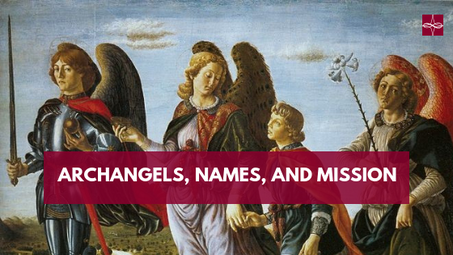



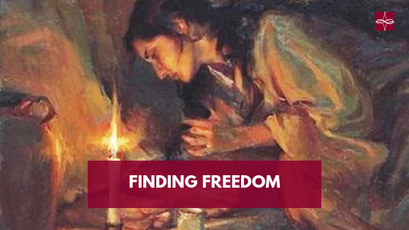



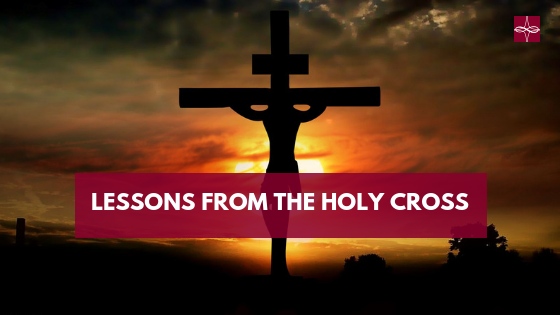
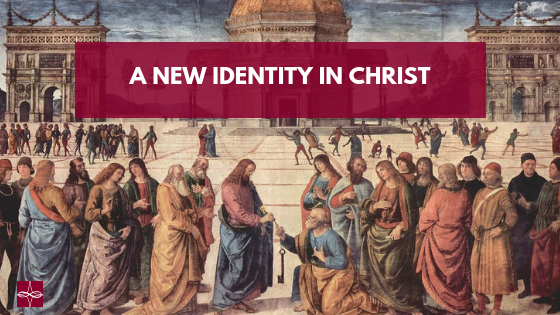

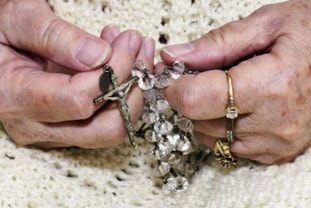
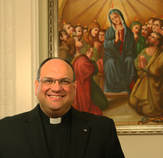
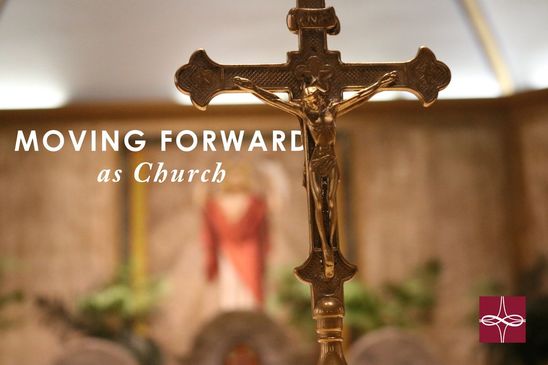
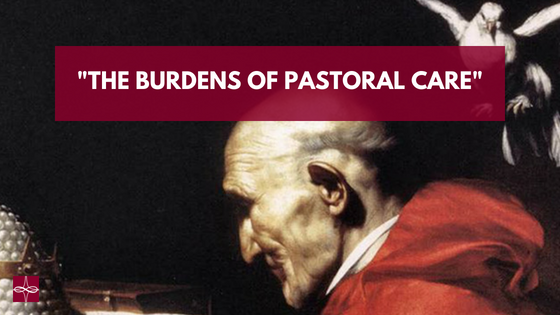

 RSS Feed
RSS Feed